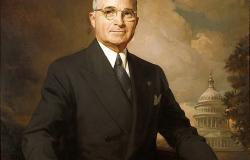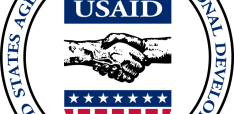The Forgotten Foundations of Point Four

Deborah Barros Leal Farias reminds us that not all foreign policy agendas are intentional.
This January marks Point Four’s 75th anniversary. Its name refers to US President Truman’s inaugural speech, which outlined four foreign policy action points. The fourth point introduced “a bold new program” to share knowledge and know-how to help “underdeveloped areas,” that was open to all “peace-loving peoples,” and whose aim was to “help the free peoples of the world.”
Point Four is a milestone for US foreign policy and foreign aid (a.k.a. development assistance) in general. It represents the ‘global birth’ of technical cooperation in the context of foreign aid, or rather, knowledge-for-development as a foreign policy tool. Since then, technical cooperation has become a crucial feature of all countries’ foreign aid repertoires. In 2021, at least over US$20 billion was given to finance technical cooperation exchanges worldwide, which could be close to US$43 billion or potentially much higher depending on the methodology used (ex, if South-South Cooperation is also included).
Point Four’s background story is commonly framed as a continuation/expansion of the US Marshall Plan and Pres. Truman’s goal to expand the US influence during the Cold War. This reading is not exactly wrong. After all, Point Four closely connects with the Marshall Plan’s development focus and with desires to contain Soviet appeal, particularly in ‘underdeveloped’ (sic) countries - the then typically used terminology for ‘developing’ countries. However, this reading of Point Four’s backstory portrays an image of a reflexive policy decision-making process that does not capture the haphazardness of what appears to have really happened.
Borrowing directly from Eric Helleiner’s book titled Forgotten Foundations of Bretton Woods, it is essential to assess Point Four's ‘forgotten foundations properly (re).’ To do so means highlighting important elements that seem to have been lost or forgotten over the decades.
Fifteen years after Point Four was announced, Louis Halle published an article with a first-hand account of its origin, which I summarize here. Halle, who was then part of the US State Department's policy planning staff, said that in late 1948, a speech-writing assistant for Pres. Truman asked the State Department to send some proposals for his inaugural speech. Three points were provided and considered OK but “boilerplate” by the presidential assistant, who said the soon-to-be President would likely want something a bit more original. The State Department’s Director of Public Affairs then mentioned that a fourth point had been suggested among the staff and initially thought of as a good idea: offering technical cooperation to ‘underdeveloped’ countries.
This point hadn’t been added to the first three suggestions because it raised too many unknowns – e.g., who would receive it? How much will it cost? What kind of technical assistance exactly? – so the Director thought it would be imprudent to send it forward to the president’s team at that moment. According to Halle, pressed by the president’s assistant, the Director mentioned that there had been a fourth point, then said what it was. The voice from the White House said, “That’s great,” and Point Four became part of the speech. Halle bluntly sums up Point Four’s origin: it “was a public-relations gimmick, thrown in by a professional speechwriter to give the speech more life.” He uses this case as an example of the gulf between theory and practice when teaching international relations.
Point Four was an unexpected ‘hit’ in the media, to the surprise of many in the incoming administration. The New York Times’ headline for January 23rd, 1949, was “World ‘Fair’ Deal,” next to a giant (above fold) map of the world entitled “The Four Points in the President’s World Program.” Robert Beisner’s book Dean Acheson: a life in the Cold War provides a slightly different account of what happened (compared to Halle). Yet, the aftermath of Pres. Truman’s speech was the same: the State Department had been “caught flatfooted,” with policy officials not knowing “what the hell” Pres. Truman had in mind. Apparently, Dean Acheson, the State Secretary himself, had only heard of Point Four when the president gave his inaugural speech and initially saw no “anti-Soviet profit” in it. Nonetheless, roughly a week after his speech, in a news conference, Truman described the origins of Point Four as something that had been in his mind “for the past two or three years, ever since the Marshall Plan was inaugurated. It originated with the Greece and Turkey proposition. Been studying it ever since.” This statement seems to have been taken at face value by (too) many for too long.
A second myth worth tackling is that Point Four created technical cooperation in the international context. There is no doubt that Truman’s speech put technical cooperation on the global agenda. However, the idea and the use of technical cooperation had already been happening before Truman’s inauguration. The US had already engaged in technical cooperation agreements with Latin American countries throughout the 1940s, which Halle mentions as the source for the suggested fourth point. Technical cooperation had also been part of the United Nations General Assembly’s work since 1946, which included passing a resolution in 1948 entitled “Technical Assistance for Economic Development.” Truman’s speech and, most importantly, its (unexpected) repercussions made technical assistance known globally, outside of Latin America and ‘elite’ diplomatic circles.
In tandem, it is also a myth that Point Four introduced the label ‘underdeveloped’ (or ‘developing’) to designate countries. As with ‘technical assistance,’ the designation already existed in the UN context, having been an intrinsic part of discussions over the Havana Charter (1948), which would have created the International Trade Organization.
Credit is certainly due to Truman’s speech, which gave widespread visibility to technical cooperation as a foreign policy tool for developing countries to a much wider audience. However, it is essential to go beyond official government statements framing Point Four as a product of deeply reflective foreign policy debates, anchored by explicit Cold War considerations, and that introduced novel concepts in the international system. In sum, Point Four was an unexpectedly impactful policy in US’ foreign aid strategy.
Deborah Barros Leal Farias is a senior Lecturer at UNSW-Sydney’s School of Social Sciences and author of Aid and Technical Cooperations as a Foreign Policy Tool for Emerging Donors: The Case of Brazil (Routledge, 2018); deborahblf@unsw.edu.au
Image: Greta Kempton via Wikimedia Commons


